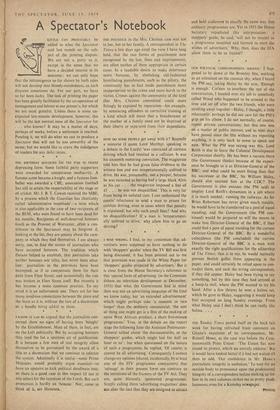I WAS WRONG, I find, in my contention that ad-
vertisers were supposed to have nothing to do with 'shoppers' guides' when the TV Bill was first being discussed; it has been pointed out to me that provision was made in the White Paper for 'shoppers' guides prepared by advertisers.' But it is clear from the Home Secretary's reference to this 'special form of advertising' (in the Commons debate on television development in December, 1953) that what the Government had in mind then was not an advertising magazine of the kind we know today, but 'an extended advertisement' which might perhaps take 'a moment or two longer' than the ordinary commercial; 'the sort of thing one might get is a film of the making of some West African product, a short five-minute programme.' True, in the debate on the report stage the following June the Assistant Postmaster- General talked about 'the documentaries, or the shoppers' guides, which might last for half an hour or so': but when questioned on the nature of such a programme, he replied, 'Of course, It cannot be all advertising.' Consequently 1 cannot change my opinion (shared, incidentally, by at least one of the ITV programme contractors) that 'admags' in their present form are contrary to the intentions of the framers of the TV Act. They are, quite blatantly, sponsored programmes. Simply calling them 'advertising magazines' does not alter the fact that they are designed to attract
and hold audiences in exactly the same way that ordinary programmes are. Yet in 1953 the Home Secretary repudiated this interpretation : a shoppers' guide, he said, 'will not be treated as a programme Moulded and formed to meet the wishes of advertisers.' Why, then, does the 1 TA allow them to be so treated?






































 Previous page
Previous page